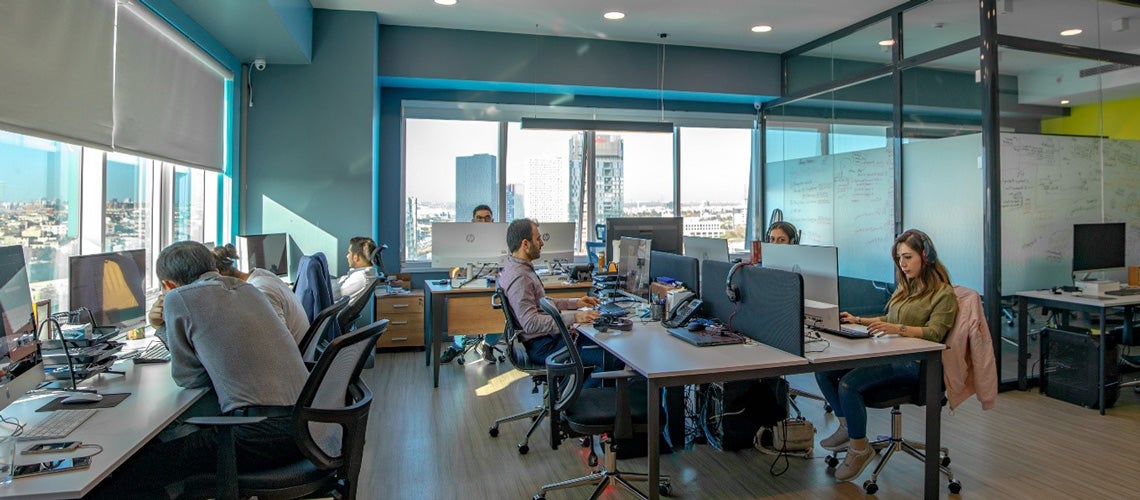 Syrian beneficiaries and Turkish citizens working in a software firm in Istanbul
Syrian beneficiaries and Turkish citizens working in a software firm in Istanbul
Imagine you are in a country where you are neither familiar with its language nor its customs or culture. Before you arrived, perhaps you were a student or a skilled laborer. You know it is going to be difficult to prove your skills in a foreign land, but you nonetheless want to work, find a sense of “normalcy,” and take charge of your life. However, even knowing where to begin - who to reach out to or where to look for opportunities for jobs or skills development – can be challenging.
In Turkey, it begins with a slip from a registration kiosk. This first step sets you on your path toward a job or an opportunity to improve your skillset by introducing you to the country’s leading public employment agency. Once there, you can now consult with an expert, improve your skills, learn Turkish, gain on-the-job experience, and expand your network.
From Istanbul to Gaziantep, Sanliurfa, and Adana, this is what the Employment Support Project (ISDEP in Turkish) pilot has been doing in four Turkish cities.
Building on existing systems for efficiency and sustainability
Since the pilot program rolled-out in 2019, nearly 25,000 beneficiaries - including refugees and Turkish citizens - have benefited from active labor market programs carried out under the Employment Support Project for Syrians under Temporary Protection and Turkish Citizens Project. This number is more than what was anticipated at the outset of the program, thanks to the tireless efforts of the Turkish Employment Agency (ISKUR) to diversify its employment services for a growing profile of jobseekers - including Syrians under Temporary Protection and their host communities, who have faced tremendous challenges with changing demographics and labor markets in their provinces as thousands of Syrians fled their own war-torn country and found refuge in Turkey.
The project offers a menu of active labor market programs, including job counseling, language training, skills training and, applied training programs. As of October 2020, more than 18,000 people have benefited from the applied training programs, while about 7,000 have been placed in language and skills training programs. About one quarter of those attending applied training programs are women, while nearly 90 percent of beneficiaries attending skills training courses are women and youth.
Except for Turkish language courses, which aim to eliminate the language barrier and facilitate integration of refugees, the programs build on ISKUR’s existing employment support services and all the hard work over the last 18 months have borne fruit, with many success stories highlighting the integration of vulnerable communities.
Road to decent jobs
Musbah Ibrahim has such a story. A Syrian beneficiary working in a textile company in Adana, as part of the applied training program, Ibrahim recalls the puzzling feeling of the first months of his arrival in Turkey.
“We had an adaptation problem in the beginning,” he explains. “The language is different, the culture is different, people were like strangers.”
He heard about the applied training program through word of mouth, so he took a slip from a registration kiosk in an ISKUR office and was assigned a Job and Vocational Counselor (JVC), who interviewed him to identify his skill-levels and employability.
Following language training to improve his Turkish skills, Musba was placed in an applied training program where he had the opportunity to improve his skills and learn about the Turkish work culture - all while receiving a stipend equivalent to his monthly minimum wage.
Other winners of the project
On the other side of this program are people like Celal Acik, the head of the Gaziantep Chamber of Coppersmiths and an employer who provides skills training courses. When we last met Acik, a year ago, we were greeted with the sounds of hammers hitting copper pots as we walked the streets of Gaziantep, where groups of beneficiaries meticulously worked on copper trays, coffeepots, and jewel boxes.
“This project is just what we needed,” said Acik. He passionately explained the project’s win-win model, which also allows employers to benefit from incentives, which cover daily allowance and social security premiums for beneficiaries.
“Beneficiaries can have insurance and pocket money from the classes they attend,” he says. “At the same time, the government encourages formal labor.
Today, 120 people have completed their training in the chamber, of which 45 have been placed in jobs while the others acquired a unique skill to build on for the rest of their career paths.
Acik explains the project’s all-encompassing nature, highlighting the support given to all actors involved - trainers, employers, and jobseeker. The project addresses informality while supporting employers and jobseekers alike by providing social security insurance and wage subsidies. It prepares jobseekers for the labor market with well-tested services and programs and facilitates work permit applications for employers.
“Who is left out of the picture?” asks Acik, rhetorically.
The 45.45 million Euro project is financed by the European Union under the framework of the EU Facility for Refugees in Turkey. The project is implemented by the Ministry of Family, Labor and Social Services of the Republic of Turkey and Turkish Employment Agency. The World Bank provides project implementation support to these public institutions which take a lead in increasing qualified employment and contribute substantially to shaping of the labor market policies in Turkey.





Join the Conversation